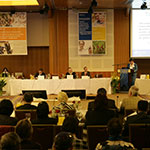First WHO European Conference on the New European Policy for Health - Health 2020
It has been recognized that most of the major public health challenges, including noncommunicable diseases and inequalities in health, cannot be addressed effectively without coordinated action across sectors at the global, European, national and local levels. One of the core aims of the new European policy for health – Health 2020 – is to promote and strengthen innovative ways of working across sector and agency boundaries for health and well-being. This also implies involving new stakeholders, actively exploring new means, and creating new partnerships while enriching existing ones.
Read moreTop story
Denmark: Working with the education sector for children’s healthThe cases highlight the role of providing school meals in improving the health of young people and its potential to reduce social inequalities in health and learning outcomes. It uses two different national approaches to school food service in Denmark and Sweden. The idea that schools should contribute to protecting children’s health by promoting healthy diets and physical activity is not new. The idea that school food service can contribute not only to improving childhood health outcomes but also to equalizing these outcomes and reduce health inequities has been introduced in a several food policies and programmes at the local, regional and national levels.
More case studiesObjectives
The main objectives of the meeting are:- to explore how a whole-of-government and whole-of-society approach can further improve health and well-being;
- to review and identify ways to establish or consolidate dialogue with critical sectors and levels of governments for Health 2020;
- to explore ways of engaging civil society in general and working more closely with nongovernmental organizations and academic institutions (responsible for research and training) across the European Region; and
- to gather feedback and reflections on test how the Health 2020 policy, as well as the emerging findings of the European study of social determinants and health and the health divide and the European study on governance for health in the 21st century ,which were commissioned to inform Health 2020.
Documentation
- Scope and purpose
- Inf Doc 6 Governance of health in the 21st century
- Inf Doc 5 The health divide: European experiences in addressing social determinants for health
- Programme
Target audience
The target audience includes: delegations of 3–4 individuals per Member State; representatives of the European Commission and European Parliament and key international agencies; representatives of donor and development agencies; representatives of nongovernmental organizations; invited experts; and WHO staff.
Read moreExpected outcomes
The meaning of and the opportunities and solutions for whole-of-government and whole-of-society approaches will be explored and demonstrated in the context of examples relating to four priority areas for public health action:
Read more



